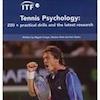Why Are There So Few Tennis Champions?

|
They are both fit and are both masters of tennis tactics, spins and strokes. The difference seems to be mental.
What piece of the mental puzzle does the top-100 player lack?
Is it confidence, self-belief? Or is it concentration, focus and emotional control?
All are possible explanations, but one seldom-recognized mental factor usually determines whether a player succeeds. This factor influences players throughout life, but that influence is strongest while they are still juniors.
It is peer acceptance.
This is the most powerful mental factor that influences our behavior, because it arouses powerful emotion. It originates from the primitive part of the brain that developed eons ago.
Fifty-thousand years ago people lived in small groups. Some hunted; some gathered berries, nuts, or fruit; some served as scouts; and so on. Each individual had a role and was an important part of the group.
This group relationship enabled survival, since being alone meant almost certain death. So every individual had to adapt to the dynamics of the group whether he or she liked them or not.

|
It helps you to be someone-to have a special identity. Although it is partly a group identity, you nevertheless are someone in that group.
Now, young tennis players want to be part of the group-their peers. What stops potential champions is the law of averages. For, in a group there will be an average level of player. Some will be a little better and some a little weaker.
When you become the best in that group, something crucial happens: most peers DON'T like you. Why? Because you are better than them, and that hurts most people's egos.
Few actually respect and support you. The vast majority will try to either bring you down in some way or make you feel uncomfortable and unaccepted.
So that's where most good players stay. The brain is programmed to need group security more than to desire being the best. For, being the best means being alone in some sense, and that is terrifying.
Therefore, a future tennis champion must choose the "lonely" way.
He must leave everyone behind and take the difficult path to the top almost alone. He must rely on those few people and friends who support him even though he is better than they are.
He needs to understand that it is not his fault that most people around him feel uncomfortable and make him uncomfortable or even unwanted. Their insecurity and their feeling of unworthiness, which they project on the champion, are to blame.
They would rather live in the illusion that everything is OK and that they are somehow happy, even though they are average and don't use their individual potential to the fullest. Yet if that were true, no one would try to bring another down. Beneath the illusion there is a constant feeling of unhappiness in those people.
Moreover, showing them what they too could achieve threatens their lazy and comfortable security of being average and just living out their days with no big goals and purposes.
Following the path to excellence would mean hard work, commitment, and accepting big responsibilities. They might as well say it aloud: "That's too much work for us. It's OK anyway, no need to stress ourselves."
And so, most young and talented players begin their journey to the top, but as soon as they move out ahead of the group, the group sends them signals that they don't "belong" to it anymore.
The implication is that the advanced player is unacceptable. So, ironically, excellence is treated as though it were a defect that somehow makes him not "good enough" for the group.
It's easier to be average so everyone likes you.
Imagine what barriers a young player must overcome. He must choose the tougher road and bear the feeling of not being accepted by most of his peers.
This is the main reason why there are so few tennis champions.
It takes a special mentality to choose that path and special circumstances (like very supportive friends and family) to overcome that feeling of not being accepted with their love and support.
You may also like -








